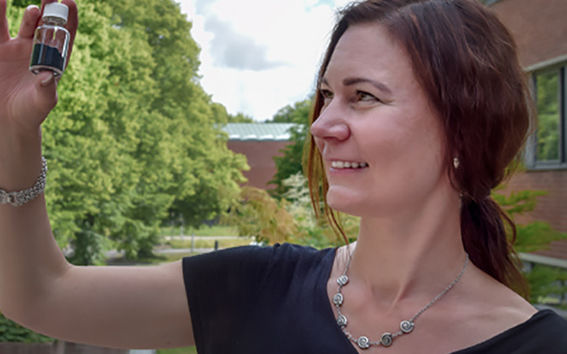Tanja Kallio, Aalto University
A career as a researcher is rewarding, and researchers are typically happy in their work, combining creativity and scientific thinking.

"The image of a researcher's work as a solitary effort is not true; work is often done together and in teams."
Tanja Kallio is a professor in the Department of Chemistry and Materials Science at Aalto University, where she researches and develops ecological and low-cost materials for batteries. Tanja's career choice has been strongly guided by her personal interests. She chose to study chemistry at Aalto University's predecessor, the Helsinki University of Technology, because she was interested in chemical reactions and the behaviour of substances. After her master's degree, Tanja continued towards a PhD. Eventually, she did her dissertation on the development of materials for fuel cells, as she was particularly interested in the development of materials for clean energy production. After her dissertation, Tanja continued to work on the same topics both in Finland and abroad in various projects until she got her current job at Aalto University.
Tanja's favourite thing about her current job is the variety of her working days and the opportunity to influence them herself. "There is no such thing as a normal working day. Sometimes we work together to discuss scientific results and solve problems. Sometimes it's teaching and preparing lectures. Sometimes I think about future research and write proposals, either alone or with colleagues. Then there is preparing presentations and giving them at scientific conferences or to a wider audience. In between, there is the management of common affairs and related meetings".
Tanja also particularly appreciates the opportunity to work on a topic that is important and interesting to her, the opportunity to learn new things and the sense of community in her work.
Tanja describes the new materials developed by her research group for energy production and storage as her greatest success. They require much less precious and relatively rare metals than before. Tanja plans to continue her research on the same topic in the future. Researchers are slowly beginning to understand how and why these new materials work, and they are already being tested in laboratory demos. "It would be great if some of the materials we develop end up in industrial applications", Tanja dreams.
For whom is this a suitable career option?
It's for someone who is interested in science and technology, fascinated by understanding phenomena and solving problems. A career as a researcher is rewarding, and researchers are typically happy in their work, combining creativity and scientific thinking. However, sometimes disappointments are also something you need to learn how to deal with. In particular a research career is much more collaborative than one might expect, as it often involves working in teams. The technical and natural sciences offer excellent opportunities for an international career where you can contribute to the well-being of the whole world. In addition, researchers can easily advance their careers to other specialist and managerial positions.